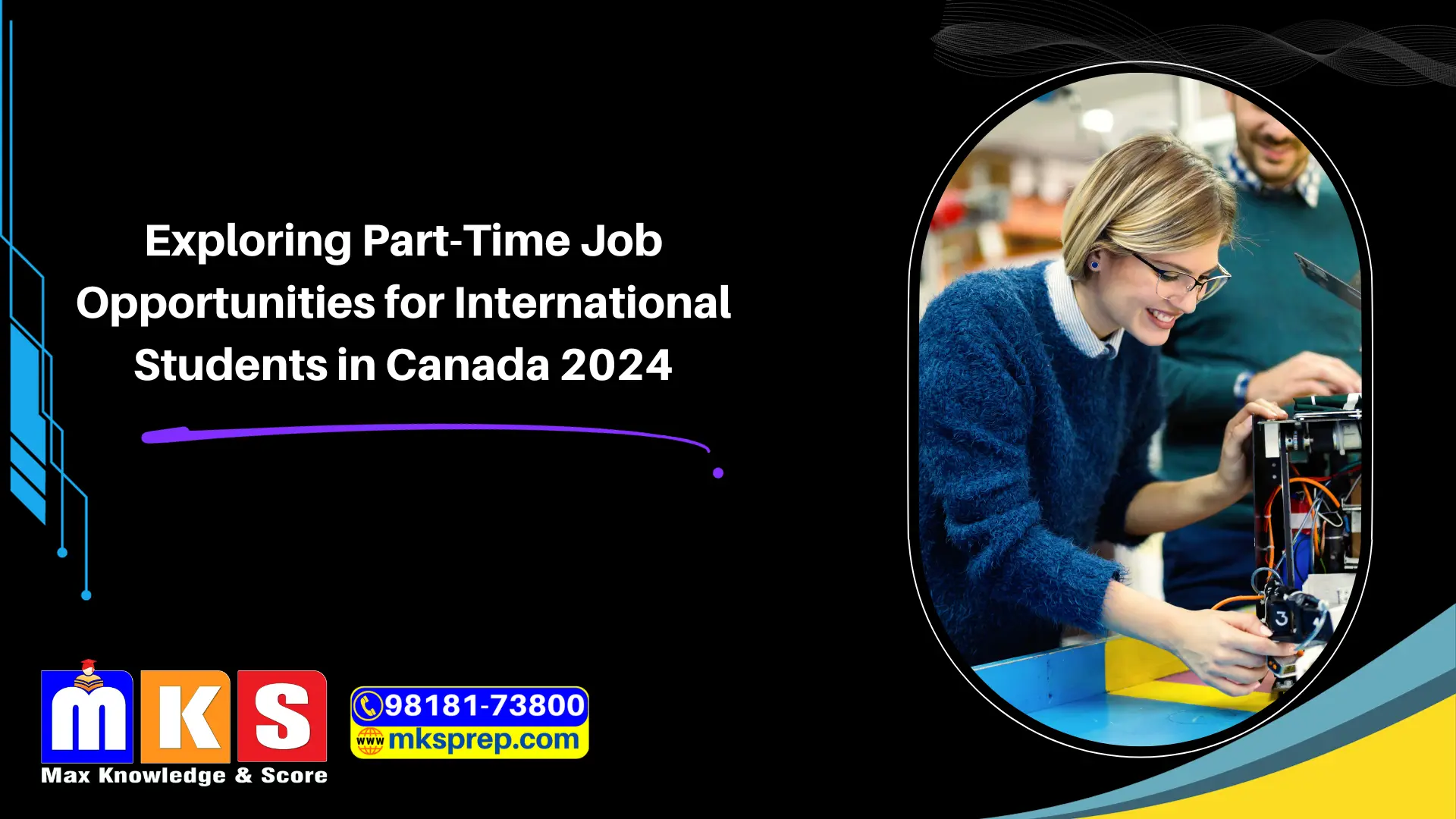
Exploring Part-Time Job Opportunities for International Students in Canada 2024
If you are interested in studying at this college, please fill out the form. Our counselor will reach out to you soon.
[ratemypost]
Explore more options
Share on social media.
Exploring Part-Time Job Opportunities for International Students in Canada
Introduction to Part-Time Employment in Canada for International Students
In Canada, allowing international students to work part-time while studying presents a valuable opportunity to gain practical experience and pave the way for permanent residence (PR). This article will delve into the significance of part-time jobs for international students, the regulations governing working hours, and the monetary aspects of part-time employment in Canada.
Benefits of Part-Time Employment for International Students
- Job Experience and PR Pathway: Working part-time allows international students to accumulate job experience, enhancing their profile for future endeavors, including applying for permanent residence in Canada.
- Networking and Professional Ties: Part-time employment provides a platform for students to build professional connections, network with industry experts, and lay the groundwork for future full-time opportunities.
Working Hours on Canadian Student Visa
On a Canadian student visa, international students can work a maximum of 20 hours per week at a paid job. However, it’s important to note that universities often advise students enrolled in challenging or intensive courses to work a maximum of 12 hours a week to maintain a balance between work and academic performance.
Monetary Compensation for Part-Time Work
- Hourly Payment System: Part-time jobs in Canada typically follow an hourly payment system, with an average pay rate of around $10 per hour.
- Work Experience without a Permit: Some academic work, such as assisting professors with research, doesn’t require a work permit. Networking with professors, albeit with lower pay, can open doors for on-campus academic work.
Considerations for International Students
- Off-Campus Work Permit: International students can apply for an off-campus work permit after completing six months of study, allowing them to work for a maximum of 20 hours per week off-campus.
- Reduced Working Hours: Students should assess their workload and reduce the number of working hours if necessary to maintain a healthy work-study-life balance.
Is Studying in Canada Worth It?
The article briefly touches upon whether it’s worth studying in Canada in 2023, emphasizing the affirmative answer based on the potential for gaining valuable work experience and the overall benefits of international education.
Eligibility and Categories of Part-Time Work for International Students
Understanding Part-Time Work Eligibility in Canada
Before international students seek part-time employment in Canada, it’s crucial to understand the eligibility criteria and various categories of work permitted.
Off-Campus Work Permit Requirements
To engage in off-campus part-time work, international students must fulfill specific requirements:
- Social Insurance Number (SIN): A 9-digit Social Insurance Number the Canadian government provides is essential for off-campus work eligibility.
- Full-Time Enrollment in a DLI: Students must be enrolled full-time in a Designated Learning Institution (DLI).
- Post-Secondary Academic Program: The academic program should be post-secondary and lead to a degree, diploma, or certificate. Programs in Quebec may include secondary-level vocational training.
- Program Duration: The academic program must be at least six months, and students can only work after the program has started.
On-Campus Work Conditions
International students can work on-campus without a permit if they meet the following conditions:
- Full-Time Enrollment: Enrollment in a full-time post-secondary course is mandatory.
- Valid Study Visa: Possession of a good study visa is required.
- Social Insurance Number (SIN): A Social Insurance Number is necessary for on-campus work.
How to Find Part-Time Jobs in Canada for International Students
Now that eligibility criteria are clear, the next step is to explore avenues for finding part-time employment.
On-Campus Job Search
- University Bulletin Boards: Most colleges and universities have bulletin boards where on-campus job openings are posted. These can include positions such as research assistants, administrative roles, or library assistants.
- University Websites: Check university websites and online portals for information on available on-campus job opportunities.
Off-Campus Job Search
- Websites and Platforms: Explore various online platforms that advertise off-campus job openings. Websites dedicated to job postings and university career services are valuable resources.
- Networking: Establishing connections with professors, peers, and industry professionals can often lead to off-campus job opportunities.
Popular Part-Time Jobs for International Students
Explore a variety of part-time job options with varying salary expectations:
- Customer service representative: $14/hour
- Cook: $13-15/hour
- Sales associate: $14/hour
- Teacher: $20-22/hour
- Web designer: $20/hour
- Dog Walker: $15/hour
- Freelancer: $25/hour
- Delivery driver: $19/hour
- Translator: $21/hour
- Writer: $25/hour
Understanding Student Visas – S-1 and SW-1
Briefly discuss the types of student visas, emphasizing the distinction between S-1 (Study Only) and SW-1 (Study and Work) visas.
Optimizing Part-Time Work Experience and Future Prospects
Heading: Maximizing the Benefits of Part-Time Work for Future Success
Balancing Work and Academics
- Adhering to Recommended Hours: While regulations permit up to 20 hours per week, students in demanding courses are advised to stick to a maximum of 12 hours to prioritize academic performance.
- Utilizing Vacation Periods: Taking advantage of vacation periods to engage in full-time work if desired.
Upgrading from S-1 to SW-1 Visa
For students initially on an S-1 Visa, discuss upgrading to an SW-1 Visa at no additional cost, mainly if they secure a co-op or internship opportunity.
Scholarships and Alternatives
- Consideration of Scholarships: Students are advised to explore scholarship opportunities that may alleviate the need for extensive part-time work, allowing them to focus more on academics.
- Seeking Guidance: Utilizing the services of study abroad counselors for assistance with university applications and navigating the intricacies of part-time work regulations.
In the next part, we will further explore the impact of part-time work on the cost of living for Indian students in Canada, potential challenges, and additional considerations for a well-rounded perspective.
Frequently Asked Questions (FAQs) about Part-Time Work for International Students in Canada
1. Can international students work part-time in Canada?
Yes, international students in Canada are allowed to work part-time while studying. Students can work 20 hours per week on a Canadian student visa at a paid job.
2. What are the benefits of working part-time for international students?
Working part-time in Canada provides international students valuable job experience, networking opportunities, and a chance to build professional ties. It can also enhance their profile for future endeavors, including applying for permanent residence (PR) in Canada.
3. How is part-time work paid in Canada?
Part-time jobs in Canada are typically paid by the hour. On average, the pay rate is around $10 per hour for international students. The pay can vary depending on the type of job and the city.
4. What are international students’ eligibility criteria for off-campus part-time work?
To engage in off-campus part-time work, international students need a 9-digit Social Insurance Number (SIN), enrollment in a full-time post-secondary program at a Designated Learning Institution (DLI), and a program duration of at least six months leading to a degree, diploma, or certificate.
5. How can international students find part-time jobs in Canada?
International students can find on-campus job opportunities through university bulletin boards, websites, and portals. Off-campus job opportunities can be explored on various online platforms, university career services, and networking.
6. What are the popular part-time jobs for international students in Canada?
Popular part-time jobs for international students in Canada include customer service representative, cook, sales associate, teacher, web designer, dog walker, freelancer, delivery driver, translator, and writer. Salary expectations can vary from job to job and city to city.
7. Are there restrictions on working hours for international students?
While international students can work up to 20 hours per week on a Canadian student visa, students enrolled in challenging courses are often advised to work a maximum of 12 hours a week to balance work and academic performance.
8. Can international students upgrade their visas for more work opportunities?
Yes, international students initially on an S-1 Visa (Study Only) can upgrade to an SW-1 Visa (Study and Work) at no additional cost, mainly if they secure a co-op, internship, or compulsory work program that requires work credits.
In the next section, we will address the impact of part-time work on the cost of living for Indian students in Canada and provide additional insights and considerations.









